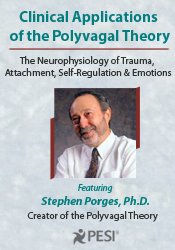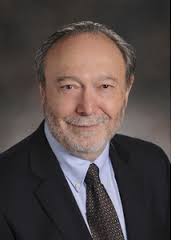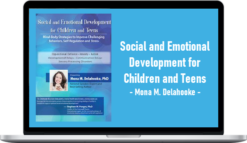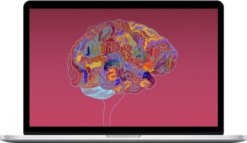Linda Curran & Stephen Porges – Clinical Applications of the Polyvagal Theory
$124.99 $50.00
»Instant Delivery
Description
Linda Curran & Stephen Porges – Clinical Applications of the Polyvagal Theory
Description Of Clinical Applications of the Polyvagal Theory

Are you consciously monitoring your client’s facial features and vocal intonation during sessions?
If not, you may be missing important therapeutic opportunities…
Since its introduction by Dr. Stephen Porges over two decades ago, the Polyvagal Theory and the Social Engagement System have provided a sophisticated understanding of the neurophysiology of emotions, trauma, attachment and self-regulation.
In this powerful online course, Dr. Porges bridges science and clinical practice to show you how the principles of the Polyvagal Theory and features of the Social Engagement System apply in the clinical setting.
You’ll learn proven strategies and effective interventions that build client safety and connectedness to mediate symptoms of trauma, PTSD, depression, autism, ADD and other mental health disorders.
Revolutionize your treatment approach and lead your clients down the path of health, growth and restoration — enroll today!
Ask yourself…
- Are the trauma, attachment and self-regulation interventions you’re using based on an outdated understanding of the neurophysiology?
- Is your treatment model rooted in an understanding of client arousal based on traditional measures without incorporating concepts from the Polyvagal Theory?
- During therapy sessions, are you aware that you and your client are responding to each other’s physiological states?
- Are your interactions with your clients missing an understanding of how mental processes influence physiology and how physiology influences cognitive, emotional, and social behavior?
If so, this is the online course for you!
What you’ll learn in Clinical Applications of the Polyvagal Theory
Here’s everything that’s covered in this in-depth training:
In this comprehensive online training, Polyvagal Theory founder Stephen Porges, Ph.D., will guide you step-by-step through four modules of in-depth training to help you effectively integrate the transformative power of Polyvagal Theory and the Social Engagement System in your practice. Here’s what’s covered in each module:
1. Module One
The Polyvagal Theory
- Principles and features of the Polyvagal Theory, and how to apply it in a clinical setting
- How the Polyvagal Theory can demystify several features related to stress-related illnesses and psychiatric disorders such as PTSD, autism, depression, and anxiety
- How the Social Engagement System is compromised by stress and trauma and how to reset it
- Evolutionary changes and adaptive functions in the autonomic nervous system
- Humans’ response hierarchy to challenges
- Three neural platforms that provide the neurophysiological bases for social engagement, fight/flight, and shutdown behaviors
2. Module Two
Social Engagement System and Psychiatric and Behavioral Disorders
- The “face-heart” connection that forms a functional social engagement system
- How our facial expressions, vocalizations, and gestures are regulated by neural mechanisms that are involved in regulating our autonomic nervous system
3. Module Three
Neuroception: Detecting and Evaluating Risk
- How our social and physical environment triggers changes in physiological state
- Understanding how adaptive physiological reactions may result in maladaptive behaviors
- Immobilization without fear
- Play as a neural exercise and listening as a neural exercise
- Fight/flight and immobilization defense strategies
- Adaptive function of immobilization and the associated clinical difficulties
- How the stresses and challenges of life distort social awareness and displace spontaneous social engagement behaviors with defensive reactions
4. Module Four
Applying the Polyvagal Theory in Clinical Settings
- Understanding auditory hypersensitivities
- State regulation as a core feature of psychiatric disorders
- Deconstructing features of autism and PTSD
- Strategies to explain disruption and repair of symbiotic regulation
- Identifying social cues that disrupt or repair defensive reaction
About Stephen Porges

Stephen W. Porges, PhD, is a distinguished University Scientist at Indiana University, where he directs the Trauma Research Center within the Kinsey Institute. He holds the position of Professor of Psychiatry at the University of North Carolina and Professor Emeritus at the University of Illinois at Chicago and the University of Maryland. He served as president of both the Society for Psychophysiological Research and the Federation of Associations in Behavioral & Brain Sciences and is a former recipient of a National Institute of Mental Health Research Scientist Development Award.
He has published more than 250 peer-reviewed scientific papers across several disciplines including anesthesiology, biomedical engineering, critical care medicine, ergonomics, exercise physiology, gerontology, neurology, neuroscience, obstetrics, pediatrics, psychiatry, psychology, psychometrics, space medicine, and substance abuse. In 1994 he proposed the Polyvagal Theory. The theory provides insights into the mechanisms mediating symptoms observed in several behavioral, psychiatric, and physical disorders including autism, anxiety, depression, ADD, PTSD, and schizophrenia. His research has led to the development of innovative interventions designed to stabilize behavioral and psychological states and to stimulate spontaneous social behavior that are being applied to autism and other clinical diagnoses.
Speaker Disclosures:
Financial: Stephen Porges is a Distinguished University Scientist at Indiana University; and a professor at the University of North Carolina. Dr. Porges has intellectual property rights, and receives royalties, from Integrated Listening Systems (iLs). He is an author for W. W. Norton and receives royalties. Dr. Porges receives a speaking honorarium from PESI, Inc.
Non-financial: Stephen Porges has no relevant non-financial relationship to disclose.
More courses from the same author: Linda Curran, Stephen Porges
Delivery Policy
When will I receive my course?
You will receive a link to download your course immediately or within 1 to 21 days. It depends on the product you buy, so please read the short description of the product carefully before making a purchase.
How is my course delivered?
We share courses through Google Drive, so once your order is complete, you'll receive an invitation to view the course in your email.
To avoid any delay in delivery, please provide a Google mail and enter your email address correctly in the Checkout Page.
In case you submit a wrong email address, please contact us to resend the course to the correct email.
How do I check status of my order?
Please log in to HealingCourse account then go to Order Page. You will find all your orders includes number, date, status and total price.
If the status is Processing: Your course is being uploaded. Please be patient and wait for us to complete your order. If your order has multiple courses and one of them has not been updated with the download link, the status of the order is also Processing.
If the status is Completed: Your course is ready for immediate download. Click "VIEW" to view details and download the course.
Where can I find my course?
Once your order is complete, a link to download the course will automatically be sent to your email.
You can also get the download link by logging into your HealingCourse account then going to Downloads Page.
Related products
Total sold: 1








